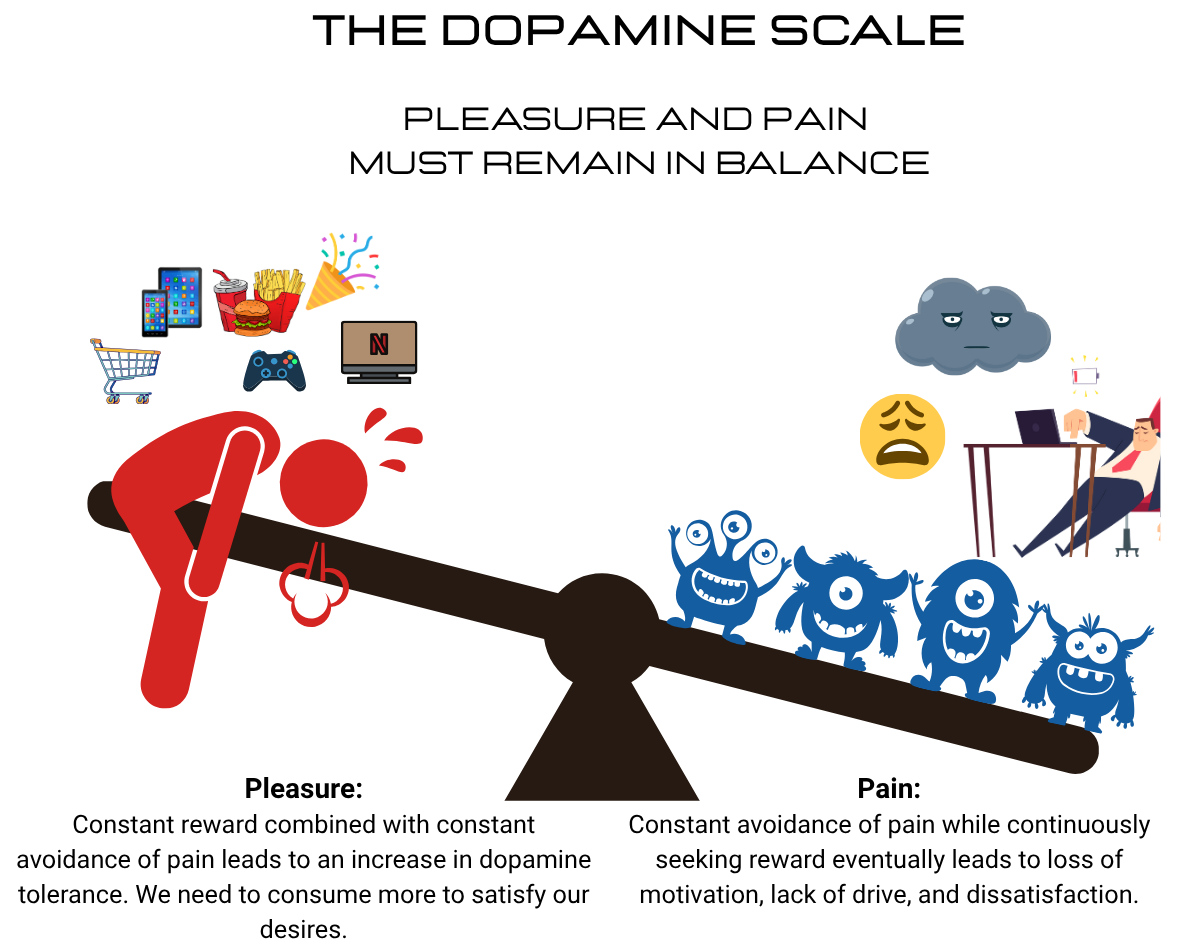Dopamine System
“Happiness consists in the absence of pain.” – Epicurus
Function and Importance of Our Dopamine System:
The Key to Motivation and Growth
Dopamine is a central neurotransmitter in the brain that fundamentally influences motivation, reward, and learning. It is released not only during positive experiences but also in response to pain, stress, and effort. Thus, dopamine plays a dual role in our behavior: it reinforces both pleasure and the willingness to face challenges.
Dopamine is released when we expect or receive a reward such as enjoying food, gaining social recognition, or achieving success. Even the anticipation of a reward activates the dopaminergic system and motivates us to continue a behavior. In this way, dopamine promotes learning processes, perseverance, and the repetition of pleasurable experiences.
Dopamine is also released in unpleasant or stressful situations. In such moments, it helps us endure effort and pain while motivating us to find solutions or persist. However, under chronic stress or pain, the dopamine system can become dysregulated, amplifying strain and weakening resilience.
Dopamine, Pain, and Self-Development: Why Less Pleasure Leads to Greater Satisfaction
Excessive or artificial dopamine stimulation (for example through sugar, drugs, social media, or constant entertainment) leads to overstimulation of the brain’s reward system. The brain adapts to high dopamine levels, making real rewards feel less satisfying. This form of the “dopamine comfort zone” fosters passivity and reduces the ability to pursue long-term goals that require effort.
Our brain is a product of evolution, shaped in a world of scarcity where survival was the top priority. It was never designed to cope with today’s overstimulating, hedonistic environment where pleasure is available at any moment. As Dr. Anna Lembke compellingly explains in her book Dopamine Nation, pleasure and pain are two sides of the same coin and they must remain in balance, a principle that kept us alive for millennia.
Pleasure motivates us to perform vital actions such as eating, drinking, and reproduction. Pain, on the other hand, protects us from danger, injury, and death. Both are essential, but neither works in isolation. When we indulge in a pleasurable stimulus, the brain releases dopamine. Yet every pleasure is followed by a “pain aftereffect”-> feelings of emptiness, restlessness, or irritability. Conversely, intentionally exposing ourselves to discomfort (through exercise, fasting, or cold) initially triggers pain but is followed by a “pleasure aftereffect”: calmness, satisfaction, and mental clarity.
The brain constantly strives for balance, a state known as homeostasis. This self-regulating mechanism ensures that neither pleasure nor pain dominates for too long. However, in today’s world, this balance is increasingly disrupted. We constantly seek gratification while avoiding discomfort at all costs. The result is an imbalance in the dopamine system.

Every time we chase pleasure, the so-called “set point” of our brain rises. We become accustomed to strong stimuli and need more and more to feel the same level of satisfaction. Dopamine goes into overdrive. What once motivated us to hunt and work now paralyzes us through overstimulation.
Our modern lifestyle provides constant, quick rewards that overstimulate the dopamine system. Food and drink are always available. Social media offers endless scrolling. Online shopping delivers instant gratification. Streaming and pornography promise limitless entertainment and pleasure. Our brains are overwhelmed. The rewards are too frequent, and the effort too small. As a result, it becomes harder to find patient, effortful activities like learning, exercising, or personal growth—rewarding. The consequences are severe: lack of focus, declining motivation, constant distraction, decreasing self-confidence, and a general sense of dissatisfaction. Sustainable well-being therefore requires a conscious approach to digital and material stimuli.
The comfort zone describes a psychological state of safety and stability. Within this zone, we experience little stress but also little growth. When we step outside the comfort zone, dopamine follows a “pain-to-reward” dynamic:
- Initial phase: Uncertainty and stress trigger an initial dopamine response that motivates us to act.
- Effort phase: Persistence and progress release more dopamine.
- Reward phase: Achieving success produces a strong surge of dopamine, reinforcing future risk-taking and enthusiasm for learning.
In this way, dopamine supports the process of personal growth—pain and challenge become the driving forces of development. The solution, therefore, does not lie in rejecting pleasure altogether, but in consciously integrating moderate discomfort into daily life. Self-development means not treating comfort as the norm but as the exception. Exercise, cold exposure, and discipline are tools to restore inner balance.
This is Mind-Craft: the art of consciously integrating challenge, discomfort, and pain to gain clarity, strength, and fulfillment.
Conclusion: Mental Health Through More Pain and Less Pleasure
Dopamine links pain and pleasure into a motivational feedback loop. It drives us to overcome challenges and achieve goals but overstimulation can lead to dependency. Personal growth arises when we deliberately step away from short-term comfort, face effort and uncertainty, and harness the brain’s natural dopamine response in a healthy, balanced way.